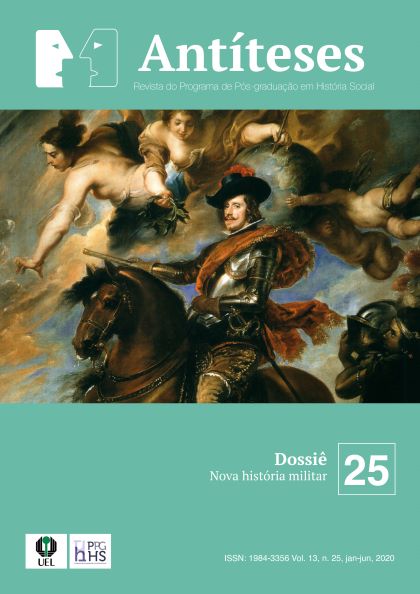Military, political ans Social Transformations at the turn to the Early Modern Times on the basis of Bartolome Scarion de Pavia's Doutrina Militar (1598)
DOI:
https://doi.org/10.5433/1984-3356.2020v13n25p510Keywords:
Medieval history, Modern históry, Iberian monarchies, Historical transformationsAbstract
In 1598, the Italian Bartolome Scarion de Pavia published the book Military doctrine inspired by the stories of wars and battles of the past and in the acts of their generals. The narrative of this work wants to show the lecturers, the rulers and especially the combatants how a battle directed by technique and rationality could be a benefit to promote peace in cities and kingdoms. Without breaking totally with the war ideals of the Classic Antiquity and the Middle Ages, this work further makes possible a lecture on how a war, carried out with passion, discernment, for Christian purposes and God's will can favor the government of the kings and enlarge their national monarchies as well as dignify the soldiers who fight for their homeland and Christian religion, especially those who live in the Iberian Monarchy reigned by Philip II. of Spain, I. of Portugal (1527-1598). In the work of Bartolome Scarion de Pavia, the military, political e social transformations occurred at the turn from the Middle Ages to the Early Modern Times, are reflected in an exemplary way.Downloads
Download data is not yet available.
References
ALVAREZ, Fernando Bouza. Portugal no tempo dos Filipes: política, cultura, representações (1580-1668). Lisboa: Edições Cosmos, 2000.
AYALA MARTÍNEZ, Carlos de. La orden del cister y las órdenes militares. In: COLÓQUIO INTERNACIONAL, CISTER, OS TEMPLARIOS E A ORDEM DE CRISTO, 1., 2012, Tomar. Actas […]. Tomar: Instituto Politécnico de Tomar, 2012.
BLACK, Jeremy. A military revolution?: military change and european society 1550-1800. Basingstoke: Red Globe Press, 1991. (Studies in European History).
CLARAVAL, Bernardo de. Elogio de la nueva milicia templaría. Traducción Iñaki Aranguren, Anne-Hélène Suarez Girard. Madrid: Ediciones Siruela, 2005.
DOLLINGER, Heinz. Lipsius, Justus. In: NEUE Deutsche Biographie, 1985. v. 14, p. 676-680. Disponível em: https://www.deutsche-biographie.de/pnd11857342X. html#ndbcontent. Acesso em: 11 dez. 2018.
DUBY, Georges. As três ordens, ou o imaginário do feudalismo. Lisboa: Estampa, 1994.
ELIAS, Norbert. O processo civilizador: formação do Estado e civilização. Rio de Janeiro: Jorge Zahar Editora, 1993. 2 v.
FERREIRA HENRIQUES, Luíz Miguel. La arenga militar en la historiografía, en la épica y en los tratados militares en lengua portuguesa y en lengua latina del siglo XVI. 2012. Tesis (Doctorado) - Facultad de Filosofia y Letras, Universidad de Extremadura, Cáceres, 2012.
FERREIRA HENRIQUES, Luíz Miguel. Retórica e historiografia: a arenga militar no séc. XVI. Hvmanitas, Coimbra, v. 66, p. 349-365, 2014. Disponível em: https:// digitalis-dsp.uc.pt/bitstream/10316.2/35109/1/Humanitas66_artigo18.pdf. Acesso em: 1 dez. 2018.
FLORI, Jean. La guerra santa: la formación de la idea de cruzada en el occidente cristiano. Madrid: Editorial Trotta, 2003.
GUENÉE, Bernard. O ocidente nos séculos XIV e XV (os Estados). São Paulo: Livraria Pioneira: Ed. da USP, 1981. Original em francês, 1971.
HAIDU, Peter. Sujeito medieval / moderno: texto e governo na Idade Média. São Leopoldo: Unisinos, 2006. Original em inglês, 2004.
ISRAEL, Jonathan. The Dutch Republic: Its rise, greatness and fall (1477-1806). Oxford: University Press, 1998.
KLEINSCHMIDT, Harald. Comprender la edad media: la trasformación de ideas y actitudes en el mundo medieval. Madrid: Akal, 2009.
LIPSIUS, Justus. De constantia libri duo. Lugdunum Batavorum: [s. n.], 1628. A primeira edição é de 1584.
LOCKE, John. Segundo tratado sobre o governo. São Paulo: Martin Claret, 2002.
MACHIAVELLI, Niccolò. Dell'arte della guerra. [Repubblica Fiorentina: s. n.],1520.
MAINKA, Peter Johann: A França na época do confessionalismo (1516-1598): a reforma protestante e as guerras civis religiosas. In: MAINKA, Peter Johann (org.). A caminho do mundo moderno: concepções clássicas da filosofia política no século XVI e o seu contexto contemporâneo. Maringá: EDUEM, 2007. p. 263-286.
MAQUIAVEL, Nicolau. O príncipe. São Paulo: Penguin Classics: Cia das Letras, 2010.
MUCHEMBLED, Robert. Una historia de la violencia: del final de la edad media a la actualidad. Madrid: Paidós Contextos, 2010.
OESTREICH, Gerhard. Strukturprobleme des europäischen absolutismus. In: OESTREICH, Gerhard. Geist und gestalt des frühmodernen staates: Ausgewählte Aufsätze. Berlin: Duncker & Humblot, 1969. p. 179-197.
OTTMANN, Henning. Die Neuzeit von Machiavelli bis zu den großen revolutionen. Stuttgart: Verlag J. B. Metzler, 2006. (Geschichte des politischen Denkens).
PARKER, Geoffrey. Felipe II: la biografía definitiva. Barcelona: Planeta, 2010.
PARKER, Geoffrey. The military revolution: military innovation and the rise of the west (1500-1800). Cambridge: University Press, 1988.
REINHARD, Wolfgang. Geschichte der staatsgewalt: eine vergleichende Verfassungsgeschichte Europas von den Anfängen bis zur Gegenwart. München: Verlag C. H. Beck, 2002. A primeira edição é de 1999.
REINHARD, Wolfgang. Pressures towards confessionalization? prolegomena to a theory of the confessional age. In: DIXON, C. Scott. (ed.) The German reformation. Oxford: Blackwell, 1999. p. 169-192.
RISCAL, Sandra Aparecida. O conceito de soberania em Jean Bodin: um estudo do desenvolvimento das ideias de administração pública, governo e Estado no século XVI. 2001. Tese (Doutorado) - Faculdade de Educação UNICAMP, Campinas, 2001.
RODRIGUES, Rui Luis. Os processos de confessionalização e sua importância para a compreensão da história do Ocidente na primeira modernidade (1530-1650). Tempo, Campinas, v. 23, n. 1, p. 7-21, jan./abr. 2017. Disponível em: http://www. scielo.br/scielo.php?script=sci_arttext&pid=S1413-77042017000100001&lng=e n&nrm=iso&tlng=pt. Acesso em: 16 mar. 2019.
ROGERS, Clifford J. (org.). The military revolution debate: readings on the military transformation of early modern europe. Boulder: Westview Press, 1995.
ROSSI, Paolo. O nascimento da ciência moderna na Europa. Bauru: EDUSC, 2001. Original em italiano, 1997.
SCARION DE PAVIA, Bartolome. Doctrina militar. Lisboa: Pedro Crasbeeck, 1598.
SCHILLING, Heinz. Konfessionalisierung und Staatsinteressen 1559-1660. Paderborn: Ferdinand Schöningh, 2007. (Handbuch der Geschichte der Internationalen Beziehungen, v. 2).
SEELAENDER, Airton Sequeira Leite. A "polícia" e as funções do estado: notas sobre a "polícia" do Antigo Regime. Revista da Faculdade de Direito/UFPR, Curitiba, n. 49, p. 73-87, 2009. Disponível em: https://revistas.ufpr.br/direito/ issue/view/969/showToc. Acesso em: 3 ago. 2019.
SKINNER, Quentin. As fundações do pensamento politico moderno. São Paulo: Companhia das Letras, 1996. Original em inglês,1978.
STRAYER, Joseph. R. As origens medievais do estado moderno. Lisboa: Gradiva, 1985.
VÁZQUEZ DE PRADA, Valentín. Felipe II y Francia (1559-1598): política, religión y razón de estado. Pamplona: Funsa: Ediciones Universidad de Navarra, 2004.
VITORIA, Francisco de. Vorlesungen (relectiones): völkerrecht, politik, kirche. Stuttgart: Verlag W. Kohlhammer, 1997. 2 v. Edição Bilíngue.
AYALA MARTÍNEZ, Carlos de. La orden del cister y las órdenes militares. In: COLÓQUIO INTERNACIONAL, CISTER, OS TEMPLARIOS E A ORDEM DE CRISTO, 1., 2012, Tomar. Actas […]. Tomar: Instituto Politécnico de Tomar, 2012.
BLACK, Jeremy. A military revolution?: military change and european society 1550-1800. Basingstoke: Red Globe Press, 1991. (Studies in European History).
CLARAVAL, Bernardo de. Elogio de la nueva milicia templaría. Traducción Iñaki Aranguren, Anne-Hélène Suarez Girard. Madrid: Ediciones Siruela, 2005.
DOLLINGER, Heinz. Lipsius, Justus. In: NEUE Deutsche Biographie, 1985. v. 14, p. 676-680. Disponível em: https://www.deutsche-biographie.de/pnd11857342X. html#ndbcontent. Acesso em: 11 dez. 2018.
DUBY, Georges. As três ordens, ou o imaginário do feudalismo. Lisboa: Estampa, 1994.
ELIAS, Norbert. O processo civilizador: formação do Estado e civilização. Rio de Janeiro: Jorge Zahar Editora, 1993. 2 v.
FERREIRA HENRIQUES, Luíz Miguel. La arenga militar en la historiografía, en la épica y en los tratados militares en lengua portuguesa y en lengua latina del siglo XVI. 2012. Tesis (Doctorado) - Facultad de Filosofia y Letras, Universidad de Extremadura, Cáceres, 2012.
FERREIRA HENRIQUES, Luíz Miguel. Retórica e historiografia: a arenga militar no séc. XVI. Hvmanitas, Coimbra, v. 66, p. 349-365, 2014. Disponível em: https:// digitalis-dsp.uc.pt/bitstream/10316.2/35109/1/Humanitas66_artigo18.pdf. Acesso em: 1 dez. 2018.
FLORI, Jean. La guerra santa: la formación de la idea de cruzada en el occidente cristiano. Madrid: Editorial Trotta, 2003.
GUENÉE, Bernard. O ocidente nos séculos XIV e XV (os Estados). São Paulo: Livraria Pioneira: Ed. da USP, 1981. Original em francês, 1971.
HAIDU, Peter. Sujeito medieval / moderno: texto e governo na Idade Média. São Leopoldo: Unisinos, 2006. Original em inglês, 2004.
ISRAEL, Jonathan. The Dutch Republic: Its rise, greatness and fall (1477-1806). Oxford: University Press, 1998.
KLEINSCHMIDT, Harald. Comprender la edad media: la trasformación de ideas y actitudes en el mundo medieval. Madrid: Akal, 2009.
LIPSIUS, Justus. De constantia libri duo. Lugdunum Batavorum: [s. n.], 1628. A primeira edição é de 1584.
LOCKE, John. Segundo tratado sobre o governo. São Paulo: Martin Claret, 2002.
MACHIAVELLI, Niccolò. Dell'arte della guerra. [Repubblica Fiorentina: s. n.],1520.
MAINKA, Peter Johann: A França na época do confessionalismo (1516-1598): a reforma protestante e as guerras civis religiosas. In: MAINKA, Peter Johann (org.). A caminho do mundo moderno: concepções clássicas da filosofia política no século XVI e o seu contexto contemporâneo. Maringá: EDUEM, 2007. p. 263-286.
MAQUIAVEL, Nicolau. O príncipe. São Paulo: Penguin Classics: Cia das Letras, 2010.
MUCHEMBLED, Robert. Una historia de la violencia: del final de la edad media a la actualidad. Madrid: Paidós Contextos, 2010.
OESTREICH, Gerhard. Strukturprobleme des europäischen absolutismus. In: OESTREICH, Gerhard. Geist und gestalt des frühmodernen staates: Ausgewählte Aufsätze. Berlin: Duncker & Humblot, 1969. p. 179-197.
OTTMANN, Henning. Die Neuzeit von Machiavelli bis zu den großen revolutionen. Stuttgart: Verlag J. B. Metzler, 2006. (Geschichte des politischen Denkens).
PARKER, Geoffrey. Felipe II: la biografía definitiva. Barcelona: Planeta, 2010.
PARKER, Geoffrey. The military revolution: military innovation and the rise of the west (1500-1800). Cambridge: University Press, 1988.
REINHARD, Wolfgang. Geschichte der staatsgewalt: eine vergleichende Verfassungsgeschichte Europas von den Anfängen bis zur Gegenwart. München: Verlag C. H. Beck, 2002. A primeira edição é de 1999.
REINHARD, Wolfgang. Pressures towards confessionalization? prolegomena to a theory of the confessional age. In: DIXON, C. Scott. (ed.) The German reformation. Oxford: Blackwell, 1999. p. 169-192.
RISCAL, Sandra Aparecida. O conceito de soberania em Jean Bodin: um estudo do desenvolvimento das ideias de administração pública, governo e Estado no século XVI. 2001. Tese (Doutorado) - Faculdade de Educação UNICAMP, Campinas, 2001.
RODRIGUES, Rui Luis. Os processos de confessionalização e sua importância para a compreensão da história do Ocidente na primeira modernidade (1530-1650). Tempo, Campinas, v. 23, n. 1, p. 7-21, jan./abr. 2017. Disponível em: http://www. scielo.br/scielo.php?script=sci_arttext&pid=S1413-77042017000100001&lng=e n&nrm=iso&tlng=pt. Acesso em: 16 mar. 2019.
ROGERS, Clifford J. (org.). The military revolution debate: readings on the military transformation of early modern europe. Boulder: Westview Press, 1995.
ROSSI, Paolo. O nascimento da ciência moderna na Europa. Bauru: EDUSC, 2001. Original em italiano, 1997.
SCARION DE PAVIA, Bartolome. Doctrina militar. Lisboa: Pedro Crasbeeck, 1598.
SCHILLING, Heinz. Konfessionalisierung und Staatsinteressen 1559-1660. Paderborn: Ferdinand Schöningh, 2007. (Handbuch der Geschichte der Internationalen Beziehungen, v. 2).
SEELAENDER, Airton Sequeira Leite. A "polícia" e as funções do estado: notas sobre a "polícia" do Antigo Regime. Revista da Faculdade de Direito/UFPR, Curitiba, n. 49, p. 73-87, 2009. Disponível em: https://revistas.ufpr.br/direito/ issue/view/969/showToc. Acesso em: 3 ago. 2019.
SKINNER, Quentin. As fundações do pensamento politico moderno. São Paulo: Companhia das Letras, 1996. Original em inglês,1978.
STRAYER, Joseph. R. As origens medievais do estado moderno. Lisboa: Gradiva, 1985.
VÁZQUEZ DE PRADA, Valentín. Felipe II y Francia (1559-1598): política, religión y razón de estado. Pamplona: Funsa: Ediciones Universidad de Navarra, 2004.
VITORIA, Francisco de. Vorlesungen (relectiones): völkerrecht, politik, kirche. Stuttgart: Verlag W. Kohlhammer, 1997. 2 v. Edição Bilíngue.
Downloads
Published
2020-08-21
How to Cite
MAINKA, Peter Johann; GIMENEZ, José Carlos. Military, political ans Social Transformations at the turn to the Early Modern Times on the basis of Bartolome Scarion de Pavia’s Doutrina Militar (1598). Antíteses, [S. l.], v. 13, n. 25, p. 510–537, 2020. DOI: 10.5433/1984-3356.2020v13n25p510. Disponível em: https://ojs.uel.br/revistas/uel/index.php/antiteses/article/view/37415. Acesso em: 17 feb. 2026.
Issue
Section
Articles
License
Copyright (c) 2020 Antiteses

This work is licensed under a Creative Commons Attribution 4.0 International License.
The journal reserves the copyright on the contributions published, without material compensation for the author, and may make them available online in Open Access mode, through its own system or other databases; you can also make normative, orthographic and grammatical changes in the originals, in order to maintain the cultured standard of the language, with the final consent of the authors. The opinions expressed by the authors are their sole responsibility.










